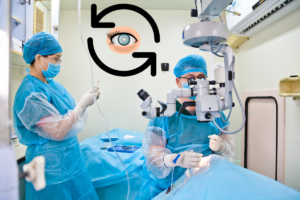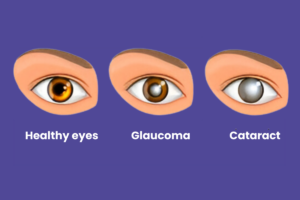How to choose the right surgeon for your cataract surgery?

Cataract surgery is one of the most common and successful medical procedures worldwide. However, the success of this procedure heavily depends on the surgeon’s expertise and the quality of care provided. Choosing the right surgeon is a critical decision that can significantly impact not only your vision but also your overall satisfaction and long-term eye health. This comprehensive guide will help you make an informed decision when selecting the best cataract surgeon.
Why does choosing the right surgeon matter?
Cataract surgery is not just a routine procedure—it’s a transformative event that significantly impacts your vision and quality of life. While the surgery is among the most commonly performed and has a high success rate globally, the outcomes are not solely dependent on technology or medical advancements. The expertise, precision, and patient-centric approach of the surgeon play a pivotal role in ensuring optimal results. Here’s why choosing the right cataract surgeon is essential:
1. Ensuring accurate diagnosis and personalized care
An experienced surgeon can identify the unique characteristics of your cataract and tailor the procedure to your needs. Every patient’s eye anatomy, vision requirements, and health profile are different, necessitating a personalized approach. A skilled surgeon takes the time to understand these nuances, ensuring a comprehensive preoperative evaluation and customized surgical plan.
2. Minimizing risks and complications
Cataract surgery involves delicate procedures like removing the clouded natural lens and replacing it with an artificial intraocular lens (IOL). While the procedure is safe, risks like infection, inflammation, or retinal detachment exist. An experienced surgeon with a proven track record is better equipped to minimize such risks, manage complications effectively, and deliver a safer surgical experience.
3. Maximizing visual outcomes
The primary goal of cataract surgery is to restore clear vision. A qualified surgeon employs advanced techniques and precision tools to achieve optimal outcomes, such as reducing refractive errors, correcting astigmatism, and ensuring proper alignment of the IOL. Their expertise can make the difference between satisfactory and exceptional vision post-surgery.
4. Access to advanced technology
Surgeons who stay updated with the latest advancements in cataract surgery, such as femtosecond laser-assisted techniques and premium IOLs, offer patients access to superior care. Advanced technology enhances surgical precision, reduces recovery time, and provides better long-term results, all of which depend on the surgeon’s willingness and ability to incorporate cutting-edge solutions.
5. Comprehensive post-surgery support
Cataract surgery doesn’t end with the procedure—it extends into post-operative care. Choosing a surgeon who emphasizes thorough follow-up ensures that your recovery is closely monitored, potential issues are addressed promptly, and your vision reaches its full potential.
6. Building trust and confidence
The surgical process can be daunting for many patients. A surgeon who communicates openly, explains the procedure clearly, and addresses concerns empathetically fosters trust and confidence. This positive relationship contributes to a smoother surgical experience and greater patient satisfaction.
7. Long-term vision health
Cataract surgery is often the beginning of a lifelong partnership with your eye surgeon. A reliable surgeon ensures continuity of care, providing guidance for maintaining your vision health and managing any future eye-related concerns.
In essence, cataract surgery is as much an art as it is a science, requiring technical skill, experience, and a compassionate approach. By choosing the right surgeon, you invest in your vision and overall well-being, ensuring a lifetime of clarity and confidence.
Factors to consider when choosing a cataract surgeon
a) Qualifications & Credentials
The first step in identifying the right cataract surgeon is to verify their qualifications. Look for an ophthalmologist with specialized training and certifications in cataract surgery. Check their educational background, residency training, and whether they are board-certified by recognized medical boards. Board certification indicates that the surgeon has met rigorous standards of competence and ethics.
b) Surgeon’s specialization in cataract surgery
Some ophthalmologists specialize in different areas, such as retinal surgery or corneal diseases. Ensure that the surgeon primarily focuses on cataract surgery and has extensive hands-on experience in this procedure.
c) Experience in cataract surgery
Experience is a critical factor in ensuring successful cataract surgery outcomes. An experienced surgeon has likely performed thousands of procedures, enabling them to handle diverse cases and unexpected complications. Don’t hesitate to ask how many cataract surgeries they have performed and their success rate. An ideal surgeon should be transparent about their experience and patient outcomes.
d) Use of advanced technology
The field of cataract surgery has seen remarkable advancements in recent years. Surgeons who adopt modern technologies, such as femtosecond laser-assisted cataract surgery, offer greater precision and better outcomes. Additionally, surgeons using advanced diagnostic tools can tailor the procedure to suit your unique eye anatomy and visual needs.
e) Hospital or Clinic affiliation
The quality of the hospital or clinic where the surgery will be performed is another critical factor. Ensure that the facility is well-equipped with state-of-the-art technology and adheres to strict hygiene and safety standards. A surgeon affiliated with a reputable eye hospital or specialty clinic is often a reliable choice.
f) Reputation & Reviews
Research the surgeon’s reputation through online reviews, testimonials, and professional affiliations. Patient reviews can provide insights into their experiences with the surgeon, including their professionalism, expertise, and post-operative care. Seek recommendations from trusted friends, family members, or your primary care doctor who may have knowledge about reputable eye surgeons.
g) Consult multiple surgeons
Don’t settle for the first surgeon you meet. Consulting multiple cataract surgeons allows you to compare treatment approaches, lens options, and overall patient experience. It also helps you gauge their communication skills, transparency, and how well they address your concerns. By getting different perspectives, you can make a more confident and informed decision about your surgery.
h) Communication & Patient care
Effective communication between you and your surgeon is essential. A good surgeon takes the time to explain the procedure, discuss risks and benefits, and address all your concerns. They should provide detailed pre- and post-operative instructions to ensure a smooth recovery. Opt for a surgeon who prioritizes patient education and makes you feel comfortable.
i) Post-surgery care
Post-operative care plays a significant role in the success of cataract surgery. Choose a surgeon who offers comprehensive follow-up care and is readily available to address any complications or concerns. Regular check-ups after surgery help monitor your recovery and ensure optimal results.
j) Availability of emergency support
Post-surgical complications, though rare, can occur. It’s essential to check whether the surgeon and their clinic/hospital provide emergency support for unexpected issues after the procedure.
k) Patient success stories & case studies
Real-life examples of successful cataract surgeries performed by the surgeon can help build confidence. Consider adding case studies or before-and-after patient experiences to demonstrate expertise.
l) Surgeon's involvement in research & continuous education
A surgeon who participates in research, clinical trials, or ongoing medical education is more likely to be up-to-date with the latest surgical advancements and best practices.
m) Personalized consultation & trial lenses
Some advanced eye hospitals offer trial lens sessions before cataract surgery to help patients better understand their vision correction options. If available, this can be a great added benefit.
n) Insurance & Affordability options
While you briefly touch on cost considerations, mentioning insurance coverage, government schemes, and financing options (if applicable) can make the guide more practical for a broader audience.
Questions to ask during consultation
Prepare a list of questions to ask the surgeon during your initial consultation. This will help you assess their expertise and suitability for your needs. Here are some essential questions:
a) About the procedure
- What type of cataract surgery do you recommend for me, and why?
- What are the potential risks and benefits of this procedure?
b) About experience
- How many cataract surgeries have you performed?
- What is your success rate?
c) About Intraocular Lenses (IOLs)
- What types of IOLs do you offer?
- Which IOL do you recommend based on my lifestyle and vision needs?
d) About technology
- Do you use laser-assisted techniques? If so, what are their advantages?
- How do you ensure precise placement of the IOL?
e) About recovery
- What can I expect during the recovery period?
- How many follow-up visits will I need?
- What should I do if I experience complications?
f) About Cost & Insurance
- What is the total cost of the procedure, including pre-op and post-op care?
- Does my insurance cover this surgery?
- Are there financing or payment plan options available?
g) About pre-surgery preparation
- Are there any medications I should stop taking before surgery?
- Will I need to make any lifestyle changes before the procedure?
- Do I need someone to accompany me on the day of surgery?
h) About long-term vision outcomes
- Will I still need glasses after surgery?
- How long do the results of cataract surgery typically last?
- Can cataracts come back after surgery?
i) About complications & Emergency care
- What are the most common complications, and how do you handle them?
- What symptoms should I watch for that might indicate a problem?
- How can I contact you in case of an emergency after surgery?
j) About anesthesia & comfort
- What type of anesthesia will be used during the surgery?
- Will I feel any pain or discomfort during or after the procedure?
k) About success rates & Case-specific risks
- Have you treated patients with similar eye conditions or health concerns as mine?
- What are the specific risks in my case, and how do you manage them?
- How do you monitor and ensure successful recovery for your patients?
l) About post-surgery care & support
- How many follow-up visits will I need?
- What should I do if I experience complications?
- How can I contact you in case of an emergency after surgery?
Red flags to watch out for
Not all surgeons provide the same level of care. Be cautious of the following warning signs:
- A surgeon who does not explain the procedure in detail or rushes through consultations.
- Lack of experience or reluctance to discuss their qualifications and patient outcomes.
- Poor reviews or unresolved complaints from patients.
- Limited or outdated technology used for the surgery.
- Unclear or vague responses to your questions about the procedure.
- Pressure to choose certain treatments without explaining alternatives.
- No clear discussion of risks or potential complications.
- Lack of a personalized approach to assessing eye health and vision needs.
- Overpromising results, such as guaranteeing “perfect vision”.
- Poor hygiene and facility standards, indicating potential safety concerns.
- No clear aftercare plan or follow-up care instructions.
The role of cost in decision-making
While cost is an important consideration, it should not be the primary factor in your decision. Higher fees often reflect the surgeon’s expertise, the quality of care, and the use of advanced technologies. Many hospitals and clinics offer flexible payment plans or financing options to make cataract surgery affordable for patients.
Why choose Dr. Dhwani Maheshwari for your cataract surgery?
Dr. Dhwani Maheshwari is a highly skilled and experienced ophthalmologist known for her expertise in cataract surgery. Here’s why she stands out:
- Extensive experience: Dr. Dhwani has successfully performed numerous cataract surgeries, ensuring excellent vision outcomes for her patients.
- State-of-the-art technology: She employs the latest advancements in laser-assisted cataract surgery and premium IOLs for superior results.
- Customized treatment plans: She offers a variety of intraocular lenses (IOLs) to match each patient’s vision needs.
- Minimally invasive procedures: Her advanced techniques ensure faster recovery and minimal discomfort.
- Comprehensive patient care: From pre-surgery counseling to post-surgery follow-ups, she ensures a seamless experience.
- Affordable & transparent pricing: With clear cost breakdowns and insurance assistance, she makes quality care accessible.
- Emergency support: Her team is available to handle any urgent concerns post-surgery.
- Trusted reputation: Her patients consistently recommend her for her professional excellence, precision, and compassionate care.
- Dedicated medical team: She is supported by an expert staff committed to providing the best patient experience.
Choosing the right cataract surgeon can make all the difference in your vision and quality of life. If you’re considering cataract surgery, trust Dr. Dhwani Maheshwari for expert care and outstanding results.
Conclusion
Choosing the right surgeon for your cataract surgery is a critical decision that requires careful consideration. By evaluating their qualifications, experience, technology, and patient care approach, you can ensure a successful outcome and restored vision. At Krisha Eye Hospital in Ahmedabad, we prioritize your vision health with experienced surgeons and state-of-the-art technology. Book a consultation today to take the first step towards clearer vision.
Author bio
Dr. Dhwani Maheshwari, an esteemed ophthalmologist with over 10 years of experience, leads Krisha Eye hospital in Ahmedabad with a commitment to advanced, patient-centered eye care. Specializing in cataract and refractive surgery, Dr. Maheshwari has performed more than a thousand successful surgeries. Her expertise lies in phacoemulsification, a technique recognized for its precision in cataract treatment.
Dr. Maheshwari’s educational journey includes an MBBS from Smt. NHL MMC, a DOMS from M & J Institute of Ophthalmology, and a DNB in Ophthalmology from Mahatme Eye Bank Eye Hospital, Nagpur. She also completed a fellowship in phacoemulsification at Porecha Blindness Trust Hospital, further enhancing her surgical skills. In addition to her work at Krisha Eye Hospital, Dr. Maheshwari serves as a consultant ophthalmologist at Northstar Diagnostic Centre.
Under her leadership, Krisha Eye Hospital aims to bring all superspecialties under one roof, offering comprehensive eye care solutions for all vision needs.
FAQs
Look for specialized training, certifications in ophthalmology, and board certification, which ensures adherence to high standards of competence and ethics.
Experience is crucial as seasoned surgeons are better equipped to handle diverse cases and potential complications, ensuring higher success rates.
Advanced technologies like femtosecond laser-assisted cataract surgery and diagnostic tools ensure precision and tailored procedures for optimal results.
Look for consistent positive feedback about the surgeon’s professionalism, expertise, and post-operative care. Avoid surgeons with frequent complaints or unresolved issues.
During the consultation, evaluate whether the surgeon takes time to explain the procedure, answers your questions clearly, and makes you feel comfortable.
A well-equipped, hygienic facility with a good reputation ensures a safer surgical environment and better patient care.
Discuss your lifestyle and vision needs with your surgeon. They should recommend an IOL type—such as monofocal, multifocal, or toric—that best suits you. To learn more about the different IOL types and how to choose the right one, check out our detailed guide on “How to choose the right cataract lens (IOL)?“.
Avoid surgeons who lack transparency about qualifications, experience, or patient outcomes, or who use outdated techniques and equipment.
While cost is a factor, prioritize expertise and technology over price. Many clinics offer financing options to make the surgery affordable.
Ask about the surgeon’s experience, success rate, recommended procedure type, IOL options, recovery expectations, and post-operative care plan.
































